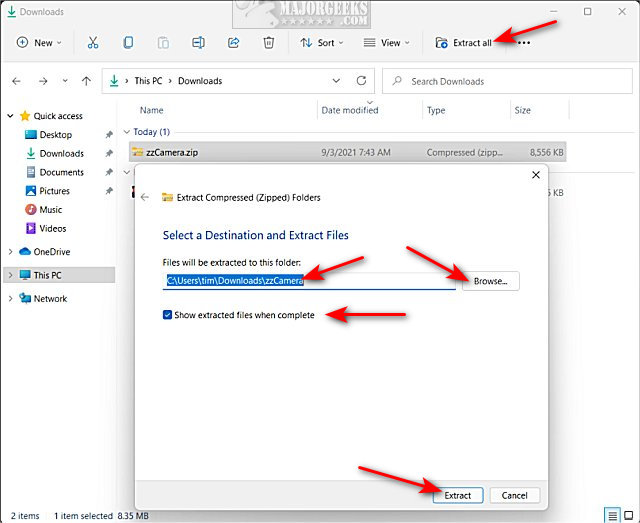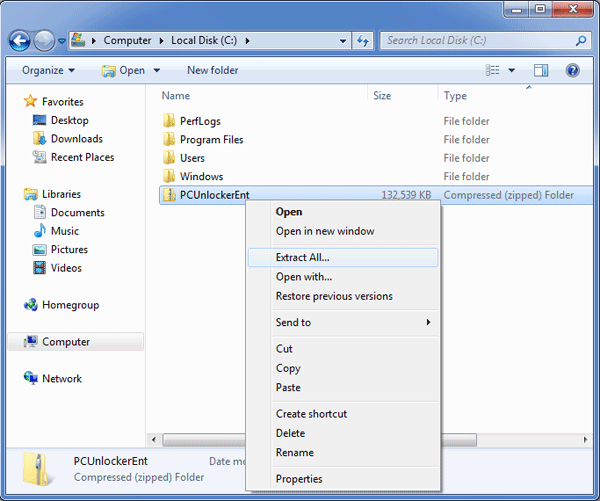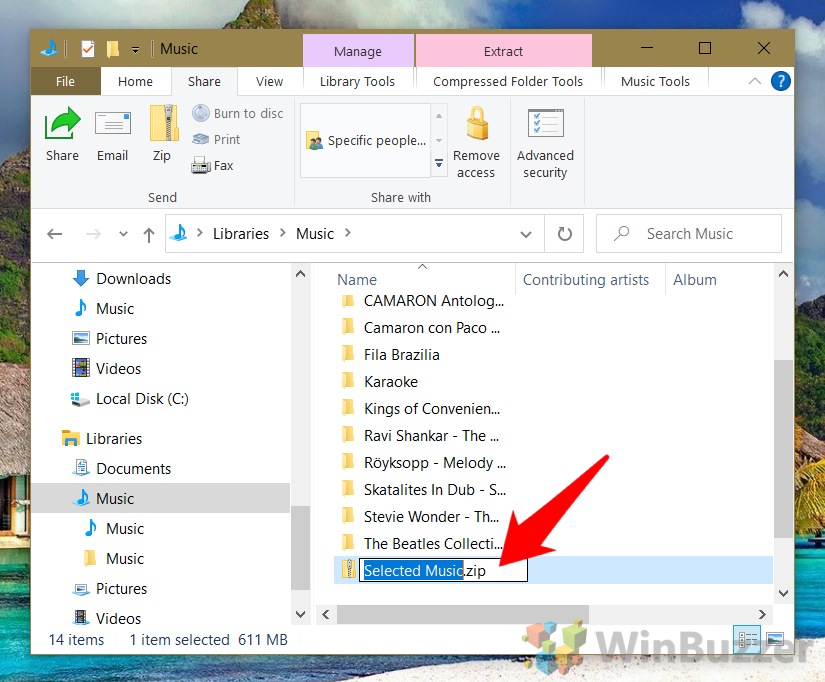Recommendation Tips About How Do I Force Unzip A File

Unzipping Files That Put Up a Fight
1. Why Can't I Just Unzip This Thing?
Ever downloaded a zipped file, eagerly anticipating its contents, only to be met with an error message? It's like finding out your favorite pizza place is closed on a Friday night — utterly disappointing. Sometimes, the standard unzipping methods just don't cut it. Maybe the file is corrupted, incomplete, or the software you're using is being finicky. Whatever the reason, you need a way to encourage that zipped file to cooperate. This article will explore "how to force unzip a file," offering you a few tools and techniques to break through those digital barriers.
Imagine this: you've spent hours downloading a massive archive of vintage photographs. The download completes, you double-click the file, and... nothing. Or worse, an error pops up claiming the archive is damaged. Panic sets in. Are all those precious images lost forever? Probably not! There are steps you can take to recover the data. Think of it as digital archaeology, carefully excavating the information hidden within the stubborn zip file.
The first thing to understand is that a failed unzip isn't always a sign of complete data loss. Often, the corruption is minor, or the unzipping program is overly sensitive. Think of it like a slightly dented can of soup. The soup inside is probably still good, you just need to find a way to open the can. Similarly, the files within your zip archive might be perfectly intact, waiting for the right approach to be extracted.
So, before you resign yourself to redownloading the entire archive, let's explore some methods to gently — or not-so-gently — persuade that zipped file to give up its secrets.

Command Line to the Rescue!
2. Unzipping with Power (and a Little Coding)
Fear not! The command line isn't as scary as it looks. It's essentially a direct line to your operating system, allowing you to issue commands that bypass the graphical interface. When it comes to unzipping, the command line offers a robust and often more reliable alternative to standard unzipping programs. It's like asking your computer to handle the unzipping directly, without any intermediaries getting in the way. Plus, it feels pretty cool to use.
On Windows, you'll need to use PowerShell. Search for "PowerShell" in the Start menu and open it. On macOS and Linux, you already have a terminal application ready to go. The command for unzipping is generally "unzip", followed by the name of the file you want to unzip. For instance, if your file is called "my_archive.zip", you would type "unzip my_archive.zip" and press Enter. The files will then be extracted to the current directory.
But what if the file is corrupted? That's where the "force" part comes in. Many unzip programs offer a flag to force the extraction, even if errors are encountered. In the case of the standard "unzip" command, you can use the "-FF" flag. So, the command would become: "unzip -FF my_archive.zip". This tells the program to try its best to extract as much data as possible, even if it encounters errors along the way. It's like telling the program, "Just get what you can, and I'll deal with the mess later!"
Keep in mind that using the force option might result in some corrupted or incomplete files. But it's often the best way to salvage something from a seemingly hopeless situation. After the process completes, carefully inspect the extracted files to identify any damaged ones. You might be surprised at how much data you were able to recover.

How To Unzip Files In Windows 11 (6 Methods)
Alternative Unzipping Software
3. When the Default Isn't Enough
Sometimes, the built-in unzipping tools that come with your operating system simply aren't up to the task. They might lack the features or robustness needed to handle complex or corrupted archives. Think of it like trying to open a stubborn jar of pickles with a flimsy butter knife — it's just not the right tool for the job. Thankfully, there are plenty of alternative unzipping programs available that offer more power and flexibility.
One popular option is 7-Zip, a free and open-source file archiver that supports a wide range of formats and offers advanced features like strong encryption and the ability to handle very large archives. Another excellent choice is PeaZip, which provides a user-friendly interface and a similar set of features. Both of these programs are known for their ability to handle corrupted or damaged archives more effectively than the default tools.
These alternative programs often have built-in repair features that can attempt to fix minor corruption within the zip file before extraction. It's like having a digital repair shop for your archives! When you encounter a stubborn zip file, try opening it with one of these programs and see if it can detect and fix any errors. You might be surprised at how often this simple step can resolve the issue.
Even if the program can't fully repair the archive, it might be able to extract some of the files while skipping over the corrupted sections. This is often better than nothing, especially if you're trying to recover important data. Just remember to carefully examine the extracted files to ensure their integrity.

How To Unzip A Compressed File Gugucalgary
Dealing with Corrupted Archives
4. Salvaging What You Can
Okay, so you've tried the command line and alternative unzipping software, but the archive is still putting up a fight. It's possible that the file is severely corrupted. Don't lose all hope! Even heavily damaged archives can sometimes be partially recovered. It's like piecing together a broken vase — you might not get the whole thing back, but you can still salvage some beautiful fragments.
Some specialized tools are designed specifically for repairing corrupted zip files. One example is DiskInternals ZIP Repair. These tools analyze the structure of the zip file and attempt to identify and fix any errors or inconsistencies. They can often recover files that would otherwise be inaccessible. However, keep in mind that these tools are not always successful, and they might not be able to recover every single file from the archive.
Another approach is to try using a data recovery program. While these programs are typically used to recover deleted files, they can also be effective at recovering data from damaged or corrupted archives. They work by scanning the storage device for remnants of the original files and attempting to reconstruct them. This can be a more time-consuming process, but it can sometimes yield surprising results. Consider it as a last-ditch effort.
Regardless of the method you choose, it's essential to make a copy of the corrupted archive before attempting any repairs. This will prevent you from accidentally overwriting or further damaging the file. Think of it like making a backup of a fragile document before attempting to repair it with tape and glue. This gives you a way to start over if something goes wrong.
![How To Zip/Unzip A File Or Folder In Windows 11 [Tutorial] YouTube How To Zip/Unzip A File Or Folder In Windows 11 [Tutorial] YouTube](https://i.ytimg.com/vi/0t6nHhk-ZcE/maxresdefault.jpg)
Prevention is Better Than Cure
5. Keeping Your Zips Healthy
While knowing how to force unzip a file is helpful, it's even better to prevent these situations from happening in the first place. Implementing some preventative measures can save you a lot of time and frustration in the long run. Think of it as taking care of your car — regular maintenance can prevent major breakdowns down the road.
One of the most common causes of zip file corruption is incomplete or interrupted downloads. When downloading large files, it's crucial to ensure that the download completes successfully without any interruptions. Use a reliable download manager that can resume interrupted downloads and verify the integrity of the downloaded files. Also check your internet connection if the files are incompletely download often. It might be some issue with it.
Another important step is to regularly scan your computer for malware. Viruses and other malicious software can sometimes corrupt files, including zip archives. Use a reputable antivirus program and keep it up-to-date to protect your system from these threats. Think of it as installing a security system for your digital data.
Finally, consider using cloud storage services to back up your important files. Cloud storage provides a redundant and secure way to store your data, protecting it from data loss due to hardware failures, accidental deletion, or other unforeseen events. It's like having a digital safety deposit box for your most valuable possessions.

FAQ
6. Quick Solutions to Common Problems
Got more questions about unzipping? Here are a few frequently asked questions to help you out.
Q: Why does it say "unexpected end of archive" when I try to unzip a file?A: This usually means the zip file is incomplete or corrupted. It might have been interrupted during download or damaged in transit. Try redownloading the file from the original source, ensure a stable internet connection, and see if that solves the issue.
Q: Can I unzip a password-protected file if I don't know the password?A: Unfortunately, no. Password-protected zip files are encrypted, and without the correct password, you won't be able to access their contents. Unless, of course, you're a super hacker in which case, you probably wouldn't be reading this article!
Q: Is it safe to "force unzip" a file?A: "Forcing" an unzip can potentially lead to corrupted files being extracted. It's generally safe, but be aware that some of the extracted files might not be usable. Always scan the extracted files with an antivirus program to be on the safe side.
Q: The unzip is stuck at 99%, what do I do?A: This can happen if there's a problem with the last few files or the archive structure. Let it sit for a little longer, sometimes it just takes time. If it's still stuck after a while, try using a different unzipping program or the command line with the force option. Make sure you have enough disk space, too.